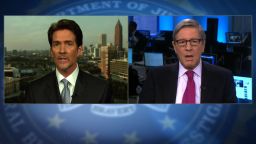Editor’s Note: Page Pate, a CNN legal analyst, is a criminal defense and constitutional lawyer based in Atlanta. He is an adjunct professor of law at the University of Georgia, a founding member of the Georgia Innocence Project, a former board member of the Federal Defender Program in Atlanta, and the former chairman of the criminal law section of the Atlanta Bar Association. Follow him on Twitter @pagepate. The opinions expressed in this commentary are his.
Story highlights
Executive privilege is a doctrine with no legal weight previously challenged in court
Page Pate: It's unlikely attempt to stop Comey's testimony by invoking it would work
Former FBI Director James Comey is expected to testify next week before the Senate intelligence committee, but President Donald Trump may try to stop him by asserting executive privilege. It would not work. Trump cannot use executive privilege to keep Comey from testifying about discussions that may point to potential misconduct, and that’s especially true now that Trump has already made those discussions public.
Although The New York Times reported that the President is not planning on doing so, he could change his mind, according to two senior administration officials.
Executive privilege is not a well-defined legal concept. You can’t find the words “executive privilege” anywhere in the Constitution. It’s not written down in any federal statute, and it’s not part of the rules of evidence.

Executive privilege is a doctrine that has developed over time to allow a president to communicate freely with his Cabinet members and staff about national security issues and other sensitive matters without being concerned those discussions would be disclosed to Congress, the courts or the public.
Presidents have often invoked executive privilege, and they have mostly failed when challenged in court. Richard Nixon tried to use executive privilege and lost. Bill Clinton tried, and he lost, too. The Obama administration asserted a type of executive privilege in connection with a congressional probe into Operation Fast and Furious. Although some documents were protected in that case, most were not.
In striking down a president’s attempts to use executive privilege, courts have focused on the reason the privilege was being asserted – was it to protect sensitive information in the public interest, or an attempt to hide potential evidence of misconduct? No court has ever allowed a president to use executive privilege to cover his own possible wrongdoing.
Courts have also looked at whether the substance of the communications had already been publicly disclosed. The Fast and Furious case is a great example. The Obama administration had already made public disclosures about its deliberations relating to that operation, so there was no need to use the privilege to maintain executive branch secrets.
In this case, Trump’s media interviews, his termination letter to Comey and his random tweets have already made his meetings with the ex-FBI chief a matter of public concern. Just like the travel ban litigation, it looks like Trump’s mouth has again foreclosed a legal defense he may really need.
The fact the White House is even thinking about asserting executive privilege raises another important question – why would Trump want to stop Comey from testifying about their meetings? There is only one reason I can think of – Trump lied.
In his interview with NBC News’ Lester Holt last month, Trump said that Comey had assured him “three times” he was not being investigated. If true, then I would think Trump would want to have Comey corroborate that in a public hearing. But is it true? Comey would not have told Trump he is not a potential target because he knows better than to disclose that kind of information.
Immediately after describing his version of discussions with Comey, Trump sent out a tweet warning Comey he “better hope there are no tapes” of their conversations. Why would Trump say that before Comey had a chance to respond to Trump’s version of the meetings? Was it because Trump must have known his version was not the truth and wanted to launch a pre-emptive strike against Comey before Comey could respond.
That’s the same approach the White House is using now to question Comey’s credibility before his upcoming testimony. The White House is worried that Comey will have a very different version of those discussions and that he felt pressured by Trump to drop the pending investigation into former national security adviser Michael Flynn. If I were in the White House, I would be worried, too.
But being worried about potentially embarrassing testimony is not a sufficient basis to invoke executive privilege. If Trump tries to stop Comey from testifying about their discussions relating to the Flynn investigation, Comey should just ignore him and do it anyway. It’s highly unlikely a court would prevent Comey, who is now a private citizen and no longer a government employee, from talking.
Trying to stop Comey from testifying by using executive privilege will almost certainly fail, but I understand why the White House would want to do it. It is extremely concerned about what Comey is going to say, and it makes sense to use every trick in the book to try and stop him from publicly humiliating the President.
Asserting executive privilege in this situation would be a desperate act, but we may have a desperate man in the White House right now.


